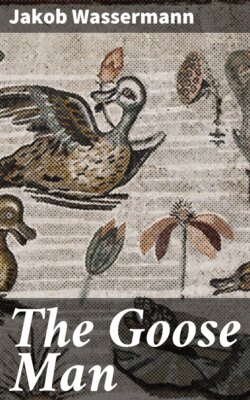Читать книгу The Goose Man - Jakob Wassermann - Страница 18
На сайте Литреса книга снята с продажи.
II
ОглавлениеTable of Contents
Daniel wandered up to the castle, along the walls, over the bridges and planks.
It was his youth that caused him so to love the night that he forgot all men and seemed to himself to be alone on earth. It was his youth that delivered him up to things with such passion that he was able to weave the ghostly flowers of melodies about all that is visible—melodies that were so delicate, so eloquent, and so winged that no pen could ever record them. They vanished and died whenever he sought to capture them.
But it was also his youth that fired his eyes with hatred when he saw the comfort of lit windows, and filled his heart with bitterness against the satisfied, the indifferent, the strangers, the eternal strangers who had no consciousness of him.
He was so small and so great: small in the eyes of the world, great in his own estimation. When the tones burst from him like sparks from an anvil, he was a god. When he stood in the dark court behind the City Theatre waiting for the final chorus of “Fidelio” to penetrate the wall and reach his grateful ears, he was an outcast. Fountains of music rustled all about him. He looked into the eyes of the children and there was melody; he gazed up at the stars and there was harmony. He finally came to the point where there was no limit. His day was a waste place, his brain a parched field in the rain, his thoughts were birds of passage, his dreams a super-life.
He lived on bread and fruit, treating himself only every third day to a warm meal in the inn at the sign of the White Tower. There he would sit and listen at times, unobserved, to the quite remarkable conversation of some young fellows. This awakened in him a longing for intercourse with congenial companions. But when the brethren of the Vale of Tears finally took him into their circle, he was like a Robinson Crusoe or a Selkirk who had been abducted from his island.
